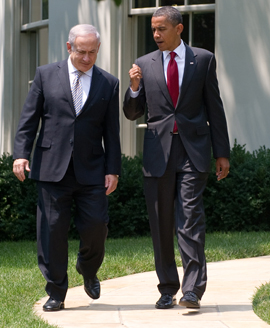US pushes direct Middle East talks
Obama tells Netanyahu he wants talks to take place before settlement suspension expires.

“My hope is that once direct talks have begun, well before the moratorium [on settlements] has expired, that that will create a climate in which everybody feels a greater investment in success,” Obama said, adding that he hoped mutual confidence-building moves would pave the way to negotiations.
‘Excellent discussions’
Netanyahu said the two men had held “excellent” discussions and that it was “high time” that direct talks with the Palestinians restarted.
He also promised “concrete steps that could be done now – in the coming days, in the coming weeks – to move the peace process further along in a very robust way”, but gave no specifics and did not indicate whether he would make new concessions on settlements.
| in depth | |||||||||||||||||||||||||||||||||||
|
A big question is whether Netanyahu will extend the partial settlement expansion suspension that he accepted only under heavy pressure from Obama – a move that could widen cracks in Netanyahu’s governing coalition, dominated by pro-settler parties, including his own Likud.
But failure to do so would anger Palestinians, who say the slow-moving indirect talks have not progressed enough to justify a return to direct negotiations suspended since December 2008, when Israel launched a 22-day offensive against the Gaza Strip that killed more than 1,300 Palestinians.
The Israeli government announced a 10-month suspension of new settlement building in the West Bank in November, but has continued moves to build settlements and demolish Palestinian homes in East Jerusalem.
Responding cautiously after the Obama-Netanyahu meeting, Palestinian officials said they were awaiting details of the steps Netanyahu intended to take.
Saeb Erekat, a senior Palestinian negotiator, said Netanyahu must choose between settlements and peace.
“We want to resume direct negotiations, but the problem is that the land that is supposed to be a Palestinian state is being eaten up by settlements,” he told The Associated Press.
He added that the Palestinian demand that Israel halt all construction in the West Bank and East Jerusalem and resume talks where they broke off in 2008 “are not conditions; these are obligations”.
Al Jazeera’s Sherine Tadros, reporting from Jerusalem, said that settlements remained at the heart of the stalemate between the Palestinians and Israelis.
“The Palestinian position is very clear: building on their land while they are talking simply shows that the Israelis are not serious about peace,” she said.
But she also pointed out that there was a lot of domestic pressure on Netanyahu not to make any more concessions on settlements.
Fawaz Gerges, a professor at the London School of Economics, agreed that Israeli settlements remained the biggest stumbling block to restarting talks.
“This Israeli government has not given the international community, the American government or the Palestinian Authority any reason to believe they are serious about the peace process,” Gerges told Al Jazeera.
Discussing Iran
Ehud Barak, the Israeli defence minister, and Salam Fayyad, the Palestinian prime minister, met on Monday to discuss “continuation of security co-ordination and economic co-ordination”.
 |
| The talks, which Netanyahu, left, said were ‘excellent’, also covered Iran [AFP] |
Both sides, however, said that the talks were separate from any direct or indirect negotiations on the so-called peace process.
In their talks at the White House on Tuesday, Netanyahu and Obama also discussed Iran, on which the US recently imposed new sanctions.
“Netanyahu is trying to convince the president that the Iranian threat tops any kind of a peace settlement between the Palestinians and the Israelis,” Gerges said.
“This has been a consistent Israeli strategy for the last two years.”
Yossi Shain, a professor from Tel Aviv University, told Al Jazeera that the Palestinian conflict was only peripherally linked to the Iranian issue and was one area where the Israeli and US administration were in agreement.
“There is agreement on this issue,” he said. “The sanctions that were imposed by the congress and signed by the president are certainly in line with the Israeli demand.”
